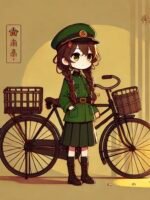Poverty Alleviation C72
by MarineTLChapter 72
After breakfast, Wu Ping and Yuan Fang took out their shoulder pole, water buckets, and homemade gourd ladles, getting ready to water their vegetable plots.
Though the couple had pensions, they belonged to a generation that had grown up frugal and hardworking. Even in retirement, they couldn’t sit still; going a day without earning money filled them with anxiety about the future.
They had several plots in Mingzhu Garden, with the closest one just downstairs.
That area was originally meant to be a flower bed for the residential complex. But after the developer ran off due to a broken capital chain, no one managed it anymore. The flower bed was only half-finished, the edges laid with decorative bricks while the inside remained empty—just perfect for growing vegetables!
“We planted all these thin-skinned peppers from heirloom seeds we brought back from the countryside. They’ve got great flavor, lots of people like them, and they sell really well,” Yuan Fang said, pointing to the patch of pepper seedlings downstairs.
To fetch a good price, they’d started nurturing the seedlings as early as last winter. They made their own little greenhouse indoors, keeping the seedlings by the stove at night and moving them outside for sunlight during the day. It was a lot of work, but it finally yielded this early-maturing local pepper patch.
Wei Sheng knew all about this!
Every year in early May, his grandma would get up at the crack of dawn and rush to the farmers’ market to snatch up the first batch of open-field, thin-skinned local peppers. These peppers were small and tender, perfect for dishes like tiger-skin peppers, stir-fried shredded pork with green pepper, or green pepper and egg—they were fragrant, spicy, and perfect with rice!
“Auntie Yuan, why don’t we add each other on social media? The vegetables you and Uncle Wu grow look delicious! Lots of the aunts and uncles in our complex love homegrown produce. I think you and Uncle Wu don’t need to work so hard setting up a stall anymore. Here’s an idea: I’ll start a vegetable-buying group chat and add in all the usual shoppers from our complex!”
“Then every afternoon, when you’re watering the garden, you can take a few pictures of what’s available and post them in the group. Mention the prices too. Anyone who wants to buy something can comment with their orders. You can pack the vegetables according to the order list and deliver them to the front gate of the complex. Easy for you, and we get fresh local produce.”
“Do you think… that could work?” Yuan Fang was clearly tempted.
Back during the lockdowns, when they still lived in their old complex, they’d gotten through it mostly by organizing bulk vegetable orders in the residents’ group chat. So she wasn’t unfamiliar with the idea of group ordering or vegetable-buying chats.
One of the big reasons they moved into this abandoned building was because they didn’t want to waste money renting anymore—but more than that, they’d had their eye on all the open space in Mingzhu Garden.
With no property management and even the urban enforcement officers turning a blind eye, they not only saved on rent but could clear the land and grow vegetables. Back then, their thinking was: if another lockdown happened, at least they wouldn’t have to pay ridiculous prices for vegetable packages again.
Eventually, they planted more and more. After earning some income selling their surplus at stalls, they got a taste for it, and their little garden turned into a thriving mini-farm.
Now, they could basically sell produce year-round. Even in the depths of winter, they had cilantro, spinach, radishes, and greens in the soil, paired with their own pickled vegetables. As long as they kept showing up with a stall, they always earned enough for daily expenses.
When it came to persuasion, social butterfly Wei Sheng never held back.
Sensing Yuan Fang’s interest, he doubled down enthusiastically—
“Auntie Yuan, think of it as doing a good deed, alright? You don’t know how some of the elderly in our complex can’t stand supermarket greenhouse vegetables. Every few days they have to take the bus—transfer multiple times!—just to get to the countryside market. It’s exhausting at their age!”
“You’ve got vegetables, and our neighbors want to buy—what a perfect match! You help us out, and you’ll sell more too.”
“It doesn’t cost anything to try, right? Just pass the time. If it doesn’t work out, worst case, it’s just a bit of lost time. But if it does work—then when the weather’s bad, you and Uncle Wu won’t have to brave the cold and wind to set up a stall.”
The cameraman almost ran off to report him to the director—Wei Sheng was at it again, “neglecting his main role,” and trying to recruit show guests into some online veggie-selling scheme!
By noon, Wu Ping and Yuan Fang were planning to slaughter one of their own free-range chickens to treat Wei Sheng. But to their surprise, Wei Sheng was eyeing the fresh fava beans in the garden instead.
“Uncle Wu, I saw a bunch of cured meat hanging in your kitchen. Why don’t we pick some fava beans and make rice with fava beans and cured pork? The kind with crispy rice at the bottom? I haven’t had that in years…” Wei Sheng was practically drooling as he spoke.
At the turn of spring to summer, local tables were always graced with steamed or braised rice dishes made with pork belly, cured meat, or sausages.
People in Province J, like most of the country, loved making sausages and cured meat during winter. But those were best eaten by early summer of the next year—any later and they lost their flavor. So this time of year, folks went all out to finish the leftover New Year’s cured meats.
The most classic approach? Mix the old with the new—kind of like pairing seasoned actors with young rising stars in TV dramas.
Cured meats were the veterans.
Fresh seasonal veggies like fava beans or peas were the young talents.
Wei Sheng especially missed the days when the complex had no property management!
Back when his grandparents lived in their old place, there were only two old guards watching the front and back gates. Their only job was to keep shady people out. They’d never boss residents around the way the current property managers did—no banning of veggie gardens, no forbidding enclosed balconies, acting like they owned the place…
Ahem—he digressed.
Back in Wei Sheng’s primary school days, many old urban complexes lacked property management. His grandma still cooked on a coal stove, using a pot that had been blackened on the outside from over a decade of use—but it made incredibly tasty meals.
Around this time every year, she’d buy a big bag of fresh fava or peas, shell them, wash them, and dice cured meat and sausages. She’d stir-fry them in oil, then set them aside.
When the rice in the pot had cooked to the point the surface liquid was almost gone, she’d pour in the stir-fried mixture, then let it cook all the way through. Just before finishing, she’d drizzle a circle of rapeseed oil along the sides of the pot, letting the bottom form a crispy golden crust. Then she’d mix the vegetables and rice thoroughly.
With that kind of cured meat and fava bean rice—or sausage and pea rice—Wei Sheng could easily eat three giant bowls!
And he absolutely had to fight for a piece of that crispy golden crust.
Thinking of the traditional stove in Wu Ping’s kitchen, the longing in Wei Sheng’s eyes practically overflowed!
Yuan Fang couldn’t help but laugh and agreed.
In the end, the entire meal cost nothing.
The fava beans were homegrown, the rice was a gift from their bank, and the cured meat came from relatives back in their hometown.
This time, Wei Sheng didn’t forget the poor cameraman. When they ate, he even asked Yuan Fang to serve a bowl of the cured meat and fava bean rice for him too.
Yuan Fang’s version was even better than Grandma Hu’s. Especially the crispy bottom—so crunchy and savory it crackled as you chewed.
Wei Sheng was convinced it was all thanks to that wood-fired stove!
Once filming for the lunch segment was done, Wu Ping and Yuan Fang got busy with their own errands. The crew didn’t want to intrude, so with time to kill, Wei Sheng decided it was time to earn a bit of money himself.
Perfect timing—he was heading to the night market with Auntie Yuanfang to help sell vegetables. Wei Sheng had been eyeing the night market business for a while. After returning home, he sawed the pipes he’d picked up earlier to the appropriate height, grouped them in threes and fives, and glued on some paint-free wooden boards to make bases.
“What are you doing?” Shen Yi walked in with a bag of vegetables and couldn’t help laughing when he saw Wei Sheng squatting on the floor crafting something again.
This kid really had zero celebrity baggage.
“Aren’t we supposed to go set up a stall at the night market with the other guests tonight? I figured since we’re going anyway, why not sell something of our own?”
As he spoke, Wei Sheng filled his handmade planters with soil, dragged over a plastic bag, and began planting the strawberry seedlings he’d gotten that morning from Wu Ping’s garden, placing them one by one into the pipes.
The pipes, which had looked a bit odd before, now took on a clean, fresh aesthetic.
After planting the strawberries, Wei Sheng examined his work, picked up a paintbrush, dipped it in paint, and began decorating the exposed parts of the pipes near the more open areas of the soil—painting a small bird, an ant holding an umbrella, a little rabbit hiding under a mushroom…
A few simple strokes, yet remarkably vivid.
“This is fun! How much are you planning to sell them for?” Shen Yi looked at Wei Sheng’s newly finished “potted plant” with obvious fondness.
There were plenty of people selling flowers and plants at the night market, but most were cut flowers or cutesy succulent arrangements. Something like this—handmade flowerpots transformed from pipes—was definitely rare.
“Heh heh~ The pipes and strawberry seedlings are cheap. It’s the labor that’s valuable. Plus my painting, so selling a set for twenty yuan isn’t too much, right?”
“Not at all… I’ll commission a set first. I’ve got a little balcony on the second floor at home that always felt kind of empty, but I never knew what to put there. Could you make me a set of these planters? Don’t plant flowers, though—veggies would be better.”
Even before opening for business, Boss Wei had already landed a big order. Feeling encouraged, he went on to make over a dozen pipe planters. For those with larger blank areas, he even added some motivational quotes in stylized lettering—they gave the whole thing a kind of poetic vibe.
By 5 PM, the Pearl Garden (Mingzhu Garden) community started to come alive. But it wasn’t because the residents were coming home from work—many had already eaten early and were getting ready to “go to work.”
In the city, people worked during the day, so the only time they could go out shopping was in the evenings. To earn more, the folks living in the unfinished apartment building had adjusted their routines to match the city’s “nighttime economy.”
From their balcony, Wei Sheng and the others could see food delivery riders, designated drivers, and errand runners in brightly colored uniforms heading out on their e-bikes to hustle for a living.
Soon, after estimating that the city management officials were off duty, people started pushing carts and pedaling tricycles loaded with goods, heading to the nearby night market to set up their stalls.
According to the show’s script, tonight’s mission was to help their paired families run their stalls.
Wu Ping and Yuanfang were also going to the market, though they usually didn’t sell vegetables at night. Instead, they sold their homemade chili sauce and pickled vegetables.
And not the kind from “Pickle Nation”—this was the local kind that people in Province J ate regularly, packed into glass jars filled with vibrant red and green ingredients that looked incredibly appetizing.
People of Yuanfang’s generation really knew how to live frugally. When vegetables like peppers, radishes, and garlic lost market value during peak harvest season, the couple stopped selling them fresh and instead turned them into pickles. One by one, these jars could be sold at the market entrance or the night market.
The large jars went for twenty yuan, the smaller ones for ten. There were always people who weren’t great at making pickles themselves who’d buy a jar to try. When calculated out, it was actually more profitable than selling the raw vegetables.
Night market stalls here were rented by the day. Wei Sheng, using the excuse of joining their stall, quickly offered to pay the twenty yuan rental fee himself.
When he saw Wu Ping and Yuanfang take out their colorful pickles, Wei Sheng had a sudden idea. “Mr. Wu, can I borrow a few jars of pickles to set up a themed stall? If someone wants to buy some from me, I’ll just have them scan your payment code directly.”
No problem at all.
Wu Ping immediately gave him a few jars.
Wei Sheng jumped into action.
He’d observed closely—attracting customers at the night market required good lighting.
Of course, it wasn’t about blinding people with strong flashlights.
He bought two sets of LED light strips from a store, used leftover wooden slats from home to build a simple frame, wrapped the light strips around it in a decorative shape, and tied two auxiliary lights to either side.
Then he arranged his handmade planters beneath the frame. It looked a bit plain at first, but he cleverly placed a few jars of pickles from Wu Ping among the strawberry plants. With the lights turned on—bam!
The pipe-based planters, under the lighting, looked as white as porcelain.
The strawberry plants had been grown by Yuanfang and her husband last winter in a greenhouse. Around Chinese New Year, when strawberries were priciest, they could sell over a thousand yuan worth a day.
By now, strawberries were out of season, but since Yuanfang loved them, Wu Ping had kept a small patch. Wei Sheng had dug up a dozen or so fruit-bearing plants and placed them in the planters. The red and green strawberries hung among lush leaves, and in the sparse spots, you could glimpse the cartoon illustrations Wei Sheng had painted.
Forget kids—even lots of young women were instantly drawn to them.
The real stroke of genius was the pickles he’d borrowed.
Anyone familiar with courtyard landscaping knows: if you want a scene to feel “alive,” you need a water element.
You can’t install a fountain at a night market stall, but Wei Sheng used the colorful pickle brine in the clear jars—floating with red and white radishes, turmeric, red chilies, and more—to bring life to his display.
The pickles bobbed gently inside the jars like playful little fish, irresistible and eye-catching.
“Boss, how much are these pickles?” A foodie finally gave in to temptation, squatted down, and pointed to the jars.
Just as Wei Sheng had finished drawing the price list, he turned it outward with a grin and pointed to the sign:
“Big jars are twenty, small ones ten. I mainly sell strawberry planters—these pickles are from my relatives, not trying to make money, just helping them sell.”
A subtle way of saying “no bargaining.”
Still, ten yuan for a large jar was genuinely affordable. The girl squatted down, took her time picking one with lots of pickled scallions, and then, unable to resist, glanced at the strawberry planters under the light.
“How much for the strawberry planters?”
Even though there was a price list, she still asked—that meant she was definitely going to haggle.
Totally understandable. Wei Sheng completely got it—he loved bargaining at night markets too. Without a bit of haggling, it just didn’t feel right.
“Just the strawberry planter? Big ones are thirty-five, small ones twenty. But since you already bought our pickles, I’ll knock two yuan off each. That’s the best I can do—fruiting four-season strawberries are hard to come by this time of year!”
Hearing him sweet-talk the girl like that, Yuanfang couldn’t help but chuckle quietly.
What do you mean “hard to find”? These strawberry plants were already slated to be discarded after the season. It was only because they still had a few strawberries hanging on that they couldn’t bear to dig them up. Once the strawberries were eaten, the plants would’ve been dug out and tossed. But after passing through Wei Sheng’s mouth, they became rare seasonal treasures.
The young lady hadn’t done any gardening before, and when he put it that way, it kind of made sense? Just the other day she went to a fruit store and saw that a tiny box of strawberries was priced at over forty yuan!
By comparison, buying a whole set of “everbearing strawberries” like this to take home and care for—wouldn’t that mean achieving strawberry freedom right at home?
The young lady immediately picked the set with the most fruit on it.
“Daddy! I want to buy that strawberry too!”
“I want the biggest one! Mommy, look, there’s a little hamster on a swing on the flowerpot! The hamster’s so cute! Mommy, I want to buy two little hamsters too…”
“Why do you want hamsters? What if our cat eats them? Look at the strawberry pots this uncle’s selling—aren’t there two hamsters painted on them? We’ll just buy this.”
The little kids who came to the night market with their parents couldn’t take a single step once they got to Wei Sheng’s stall.
No wonder—the shopping scene Wei Sheng had set up was one of a kind in the whole night market. Not just kids, even many adults squatted down in front of the stall, fascinated by what they saw.
It didn’t take long before all the strawberry planters and pickles at Wei Sheng’s stall were sold out.
Without the fun strawberry planters, only the pickles remained, and the display just didn’t have the same effect as before.
“If I’d known, I would’ve let you dig out the rest of those strawberry plants too. Who would’ve thought out-of-season strawberry plants could actually make money,” Auntie Yuanfang couldn’t help but admire how Wei Sheng’s mind worked.
Young people these days—truly something else!
And this “truly something else” Wei Sheng was about to show Auntie Yuanfang that he had another even more impressive skill up his sleeve.
(End of this chapter)

![Cannon Fodder Refuses to Be a Stepping Stone for His Cub [QT] Cover](https://marinetl.xyz/wp-content/uploads/2025/06/228114s_x16_drawing-143x200.png)





![Good Baby [Quick Transmigration] Cover](https://marinetl.xyz/wp-content/uploads/2025/01/Picsart_25-04-16_22-55-55-418-133x200.jpg)


0 Comments